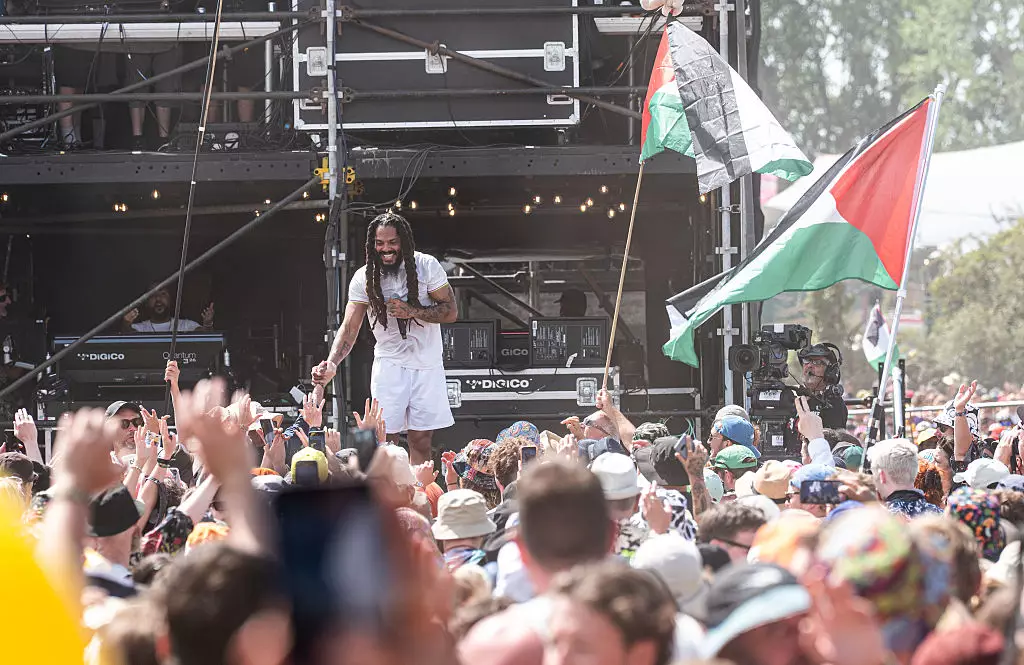The recent performance by British punk duo Bob Vylan at Glastonbury has sparked a wave of discussion, igniting a much-needed dialogue around free expression in the face of political turmoil. The festival, known for its eclectic mix of music and social commentary, became a platform for Bob Vylan to voice strong political sentiments, particularly regarding the ongoing Israeli-Palestinian conflict. The band took to the stage with fervor, leading the audience in chants that echoed through the fields of Glastonbury, demanding freedom for Palestine and condemning the actions of the Israeli Defence Forces (IDF). Their bold stance has drawn both significant applause and sharp condemnation, shining a light on the intersection of art, politics, and societal responsibility.
The Backlash from Mainstream Media
A spokesperson from the BBC responded to the performance by labeling it “deeply offensive,” and, in a surprising move, indicated that they have no intentions of making the live recording available for future viewing. This reaction raises important questions about the role of media outlets in representing diverse voices. By shutting down access to the performance, the BBC appears to sidestep a crucial discussion on freedom of speech, especially in a democratic society where public opinion is often deeply divided. The implications of denying access to a performance that is provocative yet reflective of widespread sentiment are profound. It suggests an attempt to control the narrative surrounding a complex issue and raises concerns about censorship amid rising political tensions.
The Significance of Chants
Bob Vylan’s bold, unfiltered lyrics and messages during their set resonated intensely with many in the crowd, transforming the performance into a shared moment of solidarity among attendees. The chants of “Free, Free Palestine” and “Death, Death to the IDF” were not merely political statements but declarations of identity and empathy for those suffering in conflict zones. The Palestinian flags waved amongst the crowd were symbols of resistance, underscoring a collective yearning for justice that extends beyond mere words. While many supporters rallied behind Bob Vylan’s message, others viewed these expressions as inciting violence, which sharpens the divide between differing political perspectives.
A Festival of Revelation
The atmosphere at Glastonbury is often described as transformative, a melting pot where music and social justice intermingle, enabling artists to reflect society’s undercurrents. In this context, Bob Vylan’s performance wasn’t just a musical set; it was a wake-up call about the realities faced by those in Gaza, which have often been drowned out by mainstream narratives. With thousands of lives lost and the number of civilian casualties rising sharply, it is imperative for artists and festivals to tackle uncomfortable truths. Music has historically served as a vehicle for social discourse, pushing boundaries and provoking thought, and Bob Vylan’s performance exemplified this tradition.
Responses from the Political Sphere
The reactions to Bob Vylan’s performance reached beyond social media, spilling over into political discourse. Condemnation from government officials, including statements that deem the band’s comments inappropriate, reveals an anxiety about the ripple effect of free expression in public forums. The criticism from figures such as the Prime Minister raises fundamental questions about the nature of protest and the responsibilities expected of artists in politically charged environments. Such outcries often overshadow the urgent conversations needed around the humanitarian crises that arise from conflict, illustrating the delicate balance artists must navigate when wielding their platforms.
Hip-Hop and Activism Collide
In a parallel vein, a follow-up performance by the Irish band Kneecap, which further highlighted political dissatisfaction with chants targeting Labour leader Keir Starmer, demonstrated that the festival was acting not just as a venue for entertainment but also as a breeding ground for political consciousness. Kneecap’s own legal issues related to charges of supporting alleged terrorist groups heighten the political stakes in their performance, encapsulating the risks artists face when they choose to engage with contentious issues. These instances indicate a resurgence of artist activism that hearkens back to previous decades when musicians were at the forefront of social movements.
As the festival continues to unfold, it becomes clear that Bob Vylan’s assertive statements are part of a larger cultural moment where art cannot exist in a vacuum but must respond to and reflect the struggles of society. Whether audiences are aligned with their views or not, the conversations ignited at Glastonbury pave the way for deeper examination of the issues at hand, reminding us all of the power that music and expression wield in the face of adversity.
